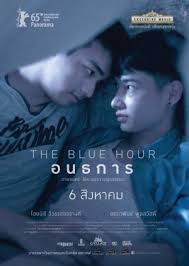
|
THE BLUE HOUR |
|||
|
Thailand, 2015, 97 minutes, Colour. Atthaphan Phunsawat, Wasuthep Ketpetch. Directed by Anucha Boonyawatana.
For many, the blue hour is that transition between darkness and light, the dusk or the dawn. And it is symbolic for the action of this film. This is a Thai film, some Buddhist cultural background, the style of filmmaking that is more contemplative than action-oriented, long takes, many close-ups, unhurried, lingering, a great deal of time for audiences to observe, reflect… The key theme of the film is homosexual orientation, an initial focus on two teenagers who connect online, who make a rendezvous in an abandoned building with an abandoned pool, a sexual encounter, conversation. The central character, Tam, is condemned by his family, a stern father, a brother involved in some criminal activities, his mother sometimes reaching out to him. The other boy, Phum, has moved away from home. On the one hand, the film shows some details of their lives, their meetings, Phum explaining that an area has been taken from his family, much of it in ruins, the discovery of a corpse, and some connections with criminal activity. On the other hand, the audience begins to wonder how much is real and how much is hallucination, what is happening in Tam’s mind. One commentator, very interestingly, even suggests that it is all in Tam’s mind, that he and Phum are two aspects of the one personality, and the action we see various examples of harmony, conflict, threats to identity, violent outbursts. Which makes the film intriguing for many, a film of great complexities. |
- The title, the time of day, dusk/dawn, the colour blue?
- Thailand, the settings, homes, the pool and its being abandoned, the wasteland, the water and the sea? Atmospheric? The musical score?
- The style of Thai filmmaking, more contemplative, lingering, unhurried, the camera spending long time in takes on locations, the characters, close-ups? The effect for the audience, to ponder and reflect?
- The gay theme, hostile family reactions, teenagers, online connections, meetings, sexual encounters? Consequences? Mutual understanding, loving response? Companionship?
- The focus on Tam age, approach, entering the pool grounds, hesitations, the meeting with Phum, hesitancy, some communication, the sexual encounter, the consequences, in the water? The leaves in the water, yet Phum and his urging to look to the sky through the water?
- The consequences for Tam, at home, the conversations with his mother, her strictness, yet her love, his father’s attitudes? His brother, criminal connections, denunciations of Tam? Tam, the accusations of stealing, his trying to hurt his father, the objects stolen? The Buddha statue? His staying out, irregular behaviour at home?
- Phum, his story, away from home, gay, freedom? The story about the land and its being taken from his family?
- The visit, the wasteland, ugly, Tam by himself, the discovery of the corpse, the consequences? Phum and his explanations?
- The ghostly atmosphere, suggestion of other worlds, the Buddhist-Thai context?
- At what stage did the audience wonder about reality and imagination, hallucinations, what was real, what was in Tam’s mind?
- The suggestion and interpretation that everything was in Tam’s mind, the creation of Phum, alter ego, unity, compensation, conflict? Family projections? The buildup to violence, his parents, his brother, criminal activity. deaths?
- The final resolution, in realistic terms with Phum and the family? In psychological terms, double personality, identity, eruption into violence?